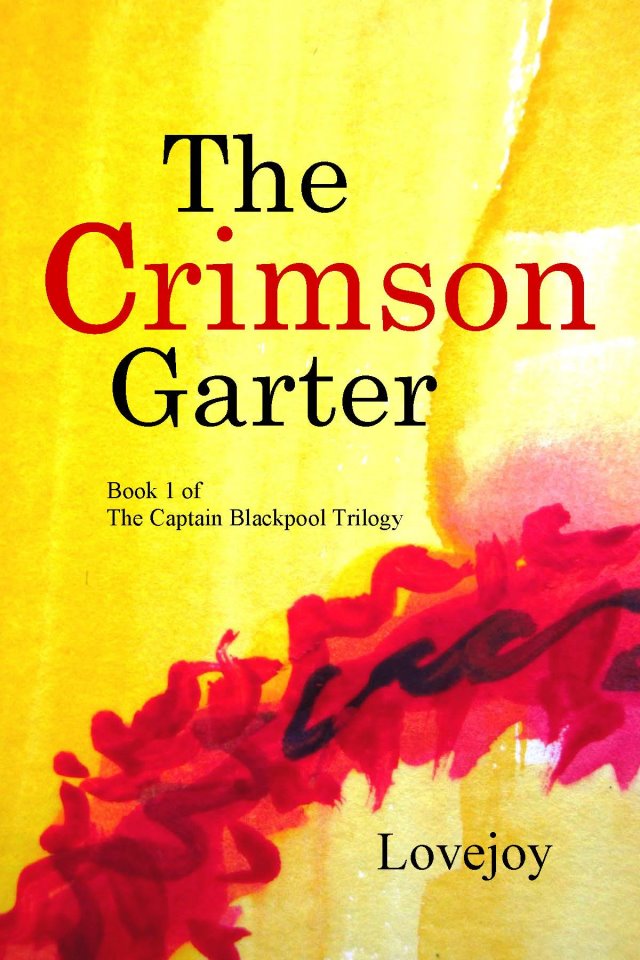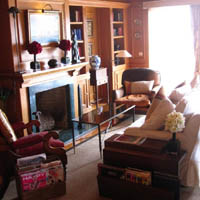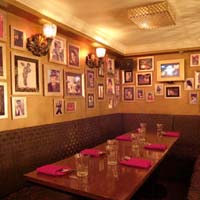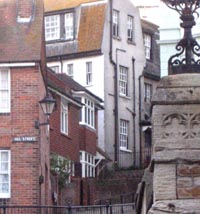
Sir Robert Marsh has plans to head to London to acquire a tract by Torvald Herdeg, and has asked his wife to join him. He has also asked Humphrey, the Earl of Pinckney, to purchase The Crimson Garter, on his behalf. As chapter seven unfolds, the Marshes are en route to London. We continue The Crimson Garter, by travel editor Stanley Moss, writing pseudonymously as Lovejoy
Chapter 7
‘Grace! Grace!’ Grazia’s eyes fluttered open and for a moment she blinked and gazed uncomprehendingly around her. In the darkness she could barely distinguish the shadowed features of strangers sitting in the coach with her, and then she realized her left forearm was being clutched and she looked up and saw the features of her husband. Her body was knotted with fatigue and she felt in her awakening consciousness the movement of the carriage, which was lurching and bumping in a most unpleasant way. ‘We are nearly there,’ Robert said, as she rearranged herself and sat up straighter, looking outside the window, trying to see what was around them. Grazia remembered that this was the seventh morning of their long journey which had begun north of Glasgow in a succession of conveyances and which had now brought them so near to their destination.
‘Robert, what is the time?’ she murmured.
Robert produced a pewter pocket watch, squinting at it in the gloom. ‘It is just now five o’clock in the morning. We should arrive at our place of lodging shortly.’
‘Are we in London yet?’
‘Oh yes, yes, we are on the outskirts of the city.’
So Grazia again pulled back the canvas cover from the coach window, and stared into the darkness. It was slightly before daybreak and what light there was from the dawn illuminated the strange grey rolling cloud above them. In the distance she could discern a number of fires glowing off at the sides of the road and groups of ragged people gathered around them, who barely glanced at the stagecoach as it careened past. An odd and fetid smell occurred to her which suffused the air. It startled her, and she remembered the sweet heather from the moors and realized that as the days had passed and they had headed farther and farther south the scents of the surrounding atmosphere had changed radically too. She coughed and pulled her heavy cloak around her, for the chill of the morning was all the more apparent. ‘Where precisely are we, Robert?’ she asked again.
‘Just northeast of London.’ The thought of the metropolis caused Grazia to think back over the past days ride. They had changed to the mail coach in Glasgow and had gone from that dark industrial city through the wet highlands and all the way down to Liverpool, its harbour clogged with the masts of ships. Her body had been buffeted about and every joint ached from the bruises and dampness and cold. She thought every bump and rut and pothole and puddle and rocky section of the road imprinted in her body. For a moment she regarded the other passengers in the coach and she realized that the gentleman with the shiny black military boots who had boarded in Glasgow was still with them, though they had changed coaches a number of times. The man said nothing to them, ever, and she never made eye contact with him. He seemed to occupy another world, one which reflected no intrusion, no interruption. Had she been asked to describe him she could not, except to say that he seemed almost invisible. Quite soon after she had first taken note of him she ceased to think of him at all.
Robert, however, was in such a rush that he allowed little time for rest between coaches and carriages and she had been forced to spend two nights in the most disreputable inns, sleeping uncomfortably only a few hours while they waited for the next connection to arrive. Then she was hustled back to the jostling and confined quarters of yet another coach. Robert seemed immune to the rigors of the road. He ever reliably consulted his watch, took out his little notebook, made notations about the arrival time to certain inns and the next coach’s departure. But for Grazia the trip was strenuous, though never too high a price to pay for London. Other memories haunted her too, specifically of a small inn outside of Birmingham where she did not expect they would stop, which she had visited years earlier when Robert first brought her north to Marshmoor as his new bride. She remembered the forceful way with which he took her that first night, in the sparse room, between the coldest of sheets, and even now the recollection of it made her shudder. The fact that he would stop again at the very same inn further repulsed her. She realized that he had no understanding of her sensitivities, that he expected her to abide by his agenda whatever it was without regard to her desires, and it made her feel further alienated from him. Robert’s conduct during the voyage made it clear that he held little regard for the rest of humanity. He ignored the other passengers, kept to himself, read a small philosophical volume he had brought along, and occasionally made notes from it. When the light was too dim he sat, eyes closed, half rocking to the carriage’s swaying motion. On occasion he would reach over and pat her hand patronizingly, adjust her cloak around her, or if the driver had got into a stretch of open road where gravity favoured them and the horses could be let loose, he clutched her hand in an iron grip, which gave her intense pain, but she could not cry out for it would only embarrass them, and she would hear of it later from him. Soon, another of the inns would appear, another meagre meal, sometimes of a quality so unsuitable that she could barely force it down her throat. Then they would retire to a humble room, where Robert would once again count his money, consult his map, and his timetables. She would fall into an uneasy sleep, only to be roused by him, the forceful hand on her forearm, shaking her, and once again, his voice ‘Grace! Grace! It is time! Wake up, girl! We must be going.’
It was near Birmingham, too, that the recollection of her wedding night brought to mind the stark contrast with the soft touch of Balthazar’s lips and his liquid eyes looking into hers on her farewell night at the Paris Opéra. The memory of Balthazar had sustained Grazia. She felt that in a single moment with Balthazar she had sensed true love in the depths of her soul as she had never known it before. It revealed the shattering emptiness of her existence with Sir Robert Marsh at Marshmoor. After the arrival of Bernadette’s letter and news of Baron Schluysen-von Holstein’s ball Grazia had begun to shape a secret fantasy of once again being reunited with her mysterious artist. But the distance from Marshmoor to Paris, and the harsh realities of her life made her doubt her own emotions. If she could only see and touch him one more time, if she could only be sure that what she had felt that night was real. Nothing short of a miracle could deliver her back into Balthazar’s arms. In the meantime she nurtured her hungry heart with the vivid memory of the soft touch of his tantalizing lips.
Seven days hence they were coming into London. In the course of their journey a succession of passengers had joined and left the coach as they made their way south. But the silent gentleman in the military boots who faced Grazia for most of the trip was the only one who remained. It seemed to Grazia an odd coincidence that another human being would be as driven as her husband to make all of the hasty connections at all of the same inns that had brought them with such speed and haste to London. At one point he had been most cordial in assisting her out of the carriage while Robert argued with the coachmen over a few pennies of the fare. Beyond that, the gentleman had kept to himself to such an extent that at most times Grazia forgot he was there. The gentleman receded innocuously to the corner of the carriage and was never noticed.
Grazia reflected on a strange feeling of independence which had seemed to come over her ever more strongly the farther away she went from Marshmoor, and the closer she came to London. At that very instant the sound of the horses’ hooves changed from the dull thudding of a muddy road to the brisk clatter of cobblestones beneath. The carriage began to travel with only an intermittent bump, and more of a constant vibration, and she knew they had come into the city proper, where the roads narrowed and some were actually lit by street lamps, where shop windows could be discerned. She noted the tradespeople who walked along the lanes, at the beginning of their dismal workday, odd-shaped tools carried over their shoulders. Strange scents began to drift across their path, leather tanneries, the pungent smells of sulphur and lye, the wafting aromas from bakeries and the meat pie sellers mixed with the standing water and putrefying waste which clogged the streets. In some quarters vendors could be heard howling the names of their wares, flowers sellers and tinkers. And then they came into what could only be a residential quarter of row houses. Some lights could already be seen glowing in the kitchen or on the lower levels as servants prepared the houses for morning. The sky became lighter, and the clouds which had appeared to be grey at the dawn revealed themselves to be tumbling, rolling yellow clouds, and she could see the plumes of smoke drifting upwards from thousands of rooftops, from unknowable numbers of coal fires travelling up from chimneys on all sides. There was a sinister, gloomy and apocalyptic quality that the city suddenly presented to her, which did not escape Grazia. And now they were moving into a seedier quarter, of older buildings, some which appeared to be abandoned, and some which were in disrepair, and some which were closed up tight. A succession of peddler’s carts, and other coaches and carriages and wagons, soldiers, passed by the coach and Grazia watched them all with a sense of wonder and recollection, remembering Paris and Rome, which she knew so well in her life before Marshmoor.
Just past six o’clock Robert touched her lightly and said, ‘Ah, my dear, Cringley’s.’ Grazia looked out and read the sign Orme Court, and saw approaching before her the Cringley Arms, for that was the official name of the hotel, as emblazoned in chipping paint on a hanging sign, which dangled dangerously from the last of the hooks which once held it in place, and which certainly presented a sombre and dingy appearance. It was housed in a three-story Tudor building, whose disrepair was immediately apparent in the number of glass window panes which had been patched with tar and canvas strips. There was also the evidence of wear in the drooping gutter, which pointed ominously downward towards the front porch and no doubt inundated the front step at any serious downpour. Over this dilapidated entrance another sign resided, nailed precipitously above the parapet, repeating the establishment’s name, with the exception of a missing A.
The carriage lurched to a halt at the doorstep, and the driver shouted, ‘First stop—Cringley Arms!’ Sir Robert left the carriage, and the doors of the hotel flew open and a hollow-chested man, extremely thin, of indeterminate age rushed out, tucking his shirt into his trousers as he scurried down the steps.
‘My lord, what an honour, what a pleasure! We received your letter days ago, honoured sir, and have been eagerly anticipating your arrival. I trust your trip was a pleasant one,’ he stammered. He produced an object from his great flopping coat pocket and began to brush Sir Robert’s shoulders with what turned out to be a nearly useless whisk broom. ‘Mr Cringley awaits you inside, my Lord.’ Sir Robert thanked him gruffly and waved him away. Now Grazia stepped from the carriage, and a sudden change of scene occurred, for her natural elegance and wistfulness altered the tenor of the moment. All stood aside, carriage man, doorman, even Sir Robert. It was as if time stopped for an instant, while La Fragolina hesitated, looking around her with a sense of wonder that the long ride was finally over, finding herself in the middle of a London scene on a damp morning, suddenly returned to civilization. She did not know what the future held for her. From now on it must—she said to herself—be richer than Marshmoor.
And now she felt Robert take her arm and lead her inside, to a cavernous dungeon of a place, where they were greeted by a portly man with rubicund cheeks and oily hair, who bowed to them. As he did this, Grazia’s nose wrinkled unconsciously, for the man reeked of spirits. ‘My lord, welcome back to Cringley Arms. Please forgive our appearance, my lord, but we had a wedding party which went on quite late, as your Lordship can image,’ he said, chuckling harshly and raucously and ending with a spasm of coughing, nose blowing, handkerchief daubing. ‘And I admit to having celebrated a bit much with the groom, who has only left us an hour ago. So you sees, My Lord …’
Robert nodded peremptorily. ‘Yes, yes, Cringley,’ he said. ‘May I present my wife.’ Here the innkeeper sized Grazia up approvingly, giving Sir Robert a confidential wink and nod. ‘Will you please show us to the room. And make sure no one disturbs us. Ours has been an exceptionally long journey.’
‘Immediately, your Lordship, right this way, Simon is coming with the baggage. Simon!’ he called impatiently, snapping his fingers. ‘We have a bit of a chill this morning, your Eminence, and while I recall that your stout constitution requires no heating, perhaps your wife might-might-might appreciate some coal in the room.’
‘I think not, Cringley,’ Robert began, and the innkeeper bowed his head a little, disappointed that Marsh’s frugal ways had in no part been affected by the presence of what was certainly a tired and frail wife. ‘We will only be here a short while.’
But Grazia had been jostled and chilled for so many days that she could bear it no longer. She looked pleadingly at her husband and said, ‘Oh, Robert, I fear I may catch some pneumonia if I do not feel heat. Could we have just a bit of coal for the brazier?’ Robert looked back and forth from his wife to Cringley.
‘Very well, my dear. But do not use too much, for you will get overheated, and then you will be truly sick.’
‘Ah, outstanding! Your Holiness will start with two buckets of coal?’
‘One scoop will be sufficient, I believe.’ With those words the deal was done. They then ascended two flights of stairs, followed by Simon who was burdened with all their luggage, followed by Cringley himself, who pushed and prodded from behind, urging him to climb faster, that His Worship was a busy man and time wasted would not do. The room, became ever the tinier with all four people in it, so the innkeeper bade them farewell, and left Simon to grapple with the valises. Once they were deposited in the minimal open space of the room, he bowed obsequiously, back-stepping as he left the room, muttering his gratitude for the scant farthings which Sir Robert grudgingly had given him. He shut the door behind him.
As soon as the man disappeared, Grazia surveyed the room and heaved a great sigh. While the room was dingy, at least it was a room, and the bed was at least a bed, though it obviously sagged in the middle. She was thankful for the fact that her bones were no longer being jostled, and she could imagine for herself a moment of peace and repose. However, within minutes Robert unpacked his sparse case, withdrew from his pocket a large sheet of paper, and began to address Grazia.
‘Now that we have arrived, my dear, let us go over the programme for the day. The auction which I wish to attend occurs at ten o’clock. It is now precisely six forty-five ante meridian,’ he said, glancing at the pocket watch he had officiously produced from a vest pocket. ‘After making my ablutions, at exactly seven-thirty I shall depart the inn on foot to take a light breakfast at an establishment near the auction house in the company of my correspondent, where we will review the items to be auctioned. The auction, as I have mentioned, begins at ten o’clock, and it should conclude by two o’clock in the afternoon. Whereupon I shall take a light repast again with my correspondent, and I shall return to the inn by four in the afternoon. You and I shall sup at five o’clock, and then retire for the evening. Tomorrow, my dear, I have several things planned which I hoped would amuse you. I thought you would enjoy seeing where my own father sat in the House of Lords, and then a visit to a dear friend who is quite a reputable taxidermist, whose collection of stuffed fowl and animal curiosities would also strike your fancy. We will have one more night’s sleep in London, but we shall need to retire quite early, for the coach leaves the following morning in darkness at four.
‘Today, in my absence, my dear Grace, I will prevail upon you to fulfil a task for Mother. You must visit a certain apothecary whom I have located, and I have written here his name and the instructions for the preparation of the concoction. In this envelope is also sufficient money to pay for Lady Dorothea’s medicine. In addition to this, I have also calculated that you shall receive change of one shilling, which shall be yours, my dear, for whatever you wish, be it a piece of ribbon, or a bauble, but I beg you to use it judiciously. You may not recognize it, Grace, but food here costs very dearly. I suggest you take your tea at the inn this morning, and eat a light breakfast. Be sure to stay away from Drury Lane and the Covent Garden area, for it is rife with pickpockets, and I enjoin you not to visit Grubb Street, which is an area of disrepute where the foulest journalists and news-mongerers congregate to hawk their wares. Remember to speak to no one unless it is absolutely necessary. You know my mother gave you sound advice before leaving, and I am sure you will remember her words. Now, how does that sound to you. My dear?’
After the rigors of the journey Grazia had hardly the strength to protest. She merely nodded weakly, but in her mind she shaped a plan to visit the apothecary as soon as possible so that she could be free to roam about London as she desired. She had also managed to save a guinea, which she had secreted into the bottom of her bag, and it was her intention to purchase a copy of Treadwell’s Gazetteer, consult the listings for theatrical productions in London, and if possible catch a midday performance somewhere in Covent Garden. In this manner she would be able to return to the inn well before Sir Robert had completed his business.
Related articles hand-picked by our editors
 Off to London, Lisbon,
Livorno, Lille, Lahore
Off to London, Lisbon,
Livorno, Lille, Lahore
Travel editor Stanley Moss updates us on his wanderings, brought
to you by the letter L
photographed by the author
 Summer in London
Summer in London
Stanley Moss packs in a lot on his London walkabout, from Asian
food to Guy Bourdin
 Rich in its memories
Rich in its memories
Stanley Moss takes in St Leonards-on-Sea, a charming seaside hamlet
in East Sussex rich in history
photographed by the author
Advertisement
Copyright ©1997–2022 by JY&A Media, part of Jack Yan & Associates. All rights reserved. JY&A terms and conditions and privacy policy apply to viewing this site. All prices in US dollars except where indicated. Contact us here.